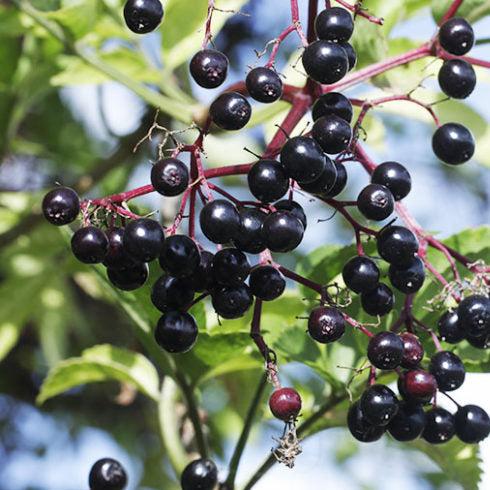An important superfruit, antioxidant and natural extract to help keep your immune system strong.
What is it?
The elderberry is the dark purple fruit from the Sambucus Nigra tree located throughout North America, Asia and Europe. It has traditionally been used in folk medicine to treat colds and flu and praised for its rich anti-oxidant properties.
How does it work?
A recent study has found that it inhibits the early stages of infection by blocking key viral proteins responsible for both viral attachment and entry into our cells [1, 2]. Furthermore, it was found that the compounds of the elderberry juice actually inhibit viral replication within our infected cells [1]. A separate study found that the extract also activates a healthy immune system and plays a role in the inflammatory process [3]. Hawkins et al. performed an analysis of 180 participants to evaluate the effects of elderberry supplementation and found that it significantly reduced the both duration and severity of upper respiratory symptoms compared to the placebo group. [4]
Translation? Elderberry extract helps fight off and reduce the time of illness caused by the flu in multiple different ways. These studies all open an interesting new door into possible future treatments of the flu. Further clinical trials are still needed however.
How do we ingest it?
While it is a fruit, it isn’t something we find in the produce aisle, and I wouldn’t recommend going picking and snacking on the berries any time soon. Raw unripe elderberries and other parts of the tree contain toxic substances that can cause severe nausea, vomiting and diarrhea.
Your best bet? A supplement!! (or maybe make jam?)
When should we take it?
There is not enough research out there to support Elderberries role in preventing illness; and it’s been said that it is best to be taken within the first 48 hours of getting sick [2]. However given its potent anti-oxidant effect, it would seem to have beneficial effects on ones immune system, but again, this is not yet backed by science.
Dosing
Currently there does not exist any universal recommendations for appropriate dosing. Rule of thumb remains to follow the products recommendation.
It is not recommended for children, pregnant women or nursing mothers simply because there is not enough data to confirm its safety in this population.
Note: Those taking immunosuppressive agents such as prednisone, mycophenolate, tacrolimus, azathioprine and others should avoid prolonged use of elderberry given their effect on the immune system. Check with your health care provider first!
So that’s all I have you.
Trying to save your PTO days? Indulge your sickness with a little elderberry and keep your eyes peeled for future research on this super fruit! I also recommend the newly launched Elderberry Support gummy. It’s delicious and contains elderberry, zinc and vitamin C!
With love from your favorite doc,
Dr. Forst
- Torabian, G., Valtchev, P., Adil, Q., & Dehghani, F. (2019). Anti-influenza activity Of Elderberry (Sambucus nigra). Journal of Functional Foods, 54, 353-360. doi:10.1016/j.jff.2019.01.031
- Zakay-Rones, Z., Thom, E., Wollan, T., & Wadstein, J. (2004). Randomized study of the efficacy and safety of oral elderberry extract in the treatment of influenza a and b virus infections. Journal of International Medical Research, 32(2), 132-140. doi:10.1177/147323000403200205
- Barak, V., Halperin, T., & Kallickman, I. (2001). The effect of Sambucol, a black elderberry-based, natural product, on the production of human cytokines. European Cytokine Network, 12(2), 290-296.
- Hawkins, J., Baker, C., Cherry, L., & Dunne, E. (2019). Black elderberry (Sambucus nigra) supplementation effectively treats upper Respiratory symptoms: A meta-analysis of randomized, controlled clinical trials. Complementary Therapies in Medicine, 42, 361-365. doi:10.1016/j.ctim.2018.12.004


